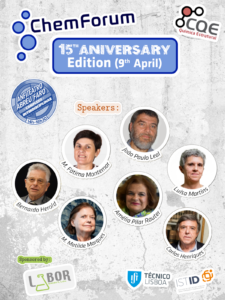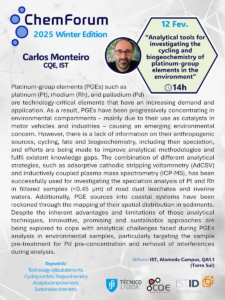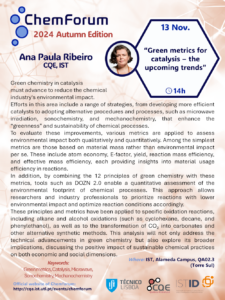ChemForum, initiated in 2010 by the Centro de Química Estrutural, offers brief, regular scientific conferences on diverse chemistry topics. Presenters include active researchers and guests from esteemed scientific centers, catering to students, researchers, and professors.
 June 2, 2025, with Professor Qi-Lin Zhou, from the National University, China.
June 2, 2025, with Professor Qi-Lin Zhou, from the National University, China.
His lecture will be on Asymmetric carbene insertion into N-H bonds
.
 May 22, 2025, with Professor Shawn D. Li, from the National Taiwan University of Science and Technology.
May 22, 2025, with Professor Shawn D. Li, from the National Taiwan University of Science and Technology.
His lecture will be on Mid-temperature carbon dioxide and water deoxygenation using hydrogen-treated cerium dioxide-based mixed oxides.
 April 9, 2025, ChemForum, CQE’s chemical dissemination platform, celebrates its 15th anniversary with a special event.
April 9, 2025, ChemForum, CQE’s chemical dissemination platform, celebrates its 15th anniversary with a special event.
It features seven 30-minutes sessions on innovative and relevant chemistry topics taking place throughout the day from 14h to18h30. The speakers will be Bernard Herold, M. Fátima Montemor, João Paulo Leal, Luísa Martins, M. Matilde Marques, Amélia Pilar Rauter and Carlos Henriques.
 March 12, 2025, with Prof. Yuri M. Strzhemechny, from Texas Christian University (USA).
March 12, 2025, with Prof. Yuri M. Strzhemechny, from Texas Christian University (USA).
His lecture will be on The role of surface/interface phenomena in the antibacterial action of nao- and microscale zinc oxide, gallium oxide and gallium hydroxide.
 February 12, 2025, with Carlos E. Monteiro from CQE.
February 12, 2025, with Carlos E. Monteiro from CQE.
His lecture will be on Analytical tools for investigating the cycling and biogeochemistry of platinum-group elements in the environment.
 December 18, 2024, with Marina Kirillova from CQE.
December 18, 2024, with Marina Kirillova from CQE.
Marina Kirillova has been a Researcher at CQE/IST-ID within the ‘CEEC Individual’ and ‘Investigator FCT’ programs since 2014. After graduating in Chemical Engineering (2001), she completed a PhD in Chemistry (2007, CQE/IST), where she later continued as a postdoctoral researcher (2008-2013). Her main research focuses on the development of new catalytic systems (metal complexes & coordination polymers) and methodologies for mild oxidative functionalization of alkanes into derivatives with industrial significance, as well as catalytic valorization of renewable substrates (biogas, terpenes & CO2). Marina has been a PI of several projects, and her research was recognized by a number of distinctions, including the highlight in ‘100 Portuguese Women in Science’ by Ciência Viva, ‘L’ORÉAL Portugal Award for Women in Science’, and ‘Delloite/TU Lisbon Young Investigator Award’.
The C-H functionalization of renewable feedstocks such as light alkanes, biogas and terpenes is a hot topic in the areas spanning from sustainable synthesis to coordination chemistry and catalysis. Although saturated hydrocarbons are widely used as substrates for preparing many chemicals of industrial significance, the reactions behind these processes usually require several steps and harsh conditions due to elevated inertness of alkanes. In the context of green chemistry, the search for more sustainable and inexpensive catalytic systems that are capable of activating hydrocarbons under mild conditions represents a challenging objective. In the present talk, the following main topics of our recent research will be highlighted: • Design and synthesis of metal complexes and coordination polymers as prospective catalysts for C-H functionalization of hydrocarbons; • Multicopper(II) catalytic systems for mild oxidation and hydrocarboxylation of light alkanes into alcohols, ketones, and carboxylic acids; • Aqueous-medium catalytic systems and hydrothermal catalysis for conversion of renewable feedstocks (biogas and gaseous alkanes); • From citrus waste to value: optimization of sulfonated carbons for limonene upcycling into value-added products; • Mild oxidative functionalization of α-pinene catalyzed by copper(II) coordination polymers.

In addition, by combining the 12 principles of green chemistry with these metrics, tools such as DOZN 2.0 enable a quantitative assessment of the environmental footprint of chemical processes. This approach allows researchers and industry professionals to prioritize reactions with lower environmental impact and optimize reaction conditions accordingly. These principles and metrics have been applied to specific oxidation reactions, including alkane and alcohol oxidations (such as cyclohexane, decane, and phenylethanol), as well as to the transformation of CO₂ into carbonates and other alternative synthetic methods. This analysis will not only address the technical advancements in green chemistry but also explore its broader implications, discussing the positive impact of sustainable chemical practices on both economic and social dimensions.


 January 15, 2025,
January 15, 2025,